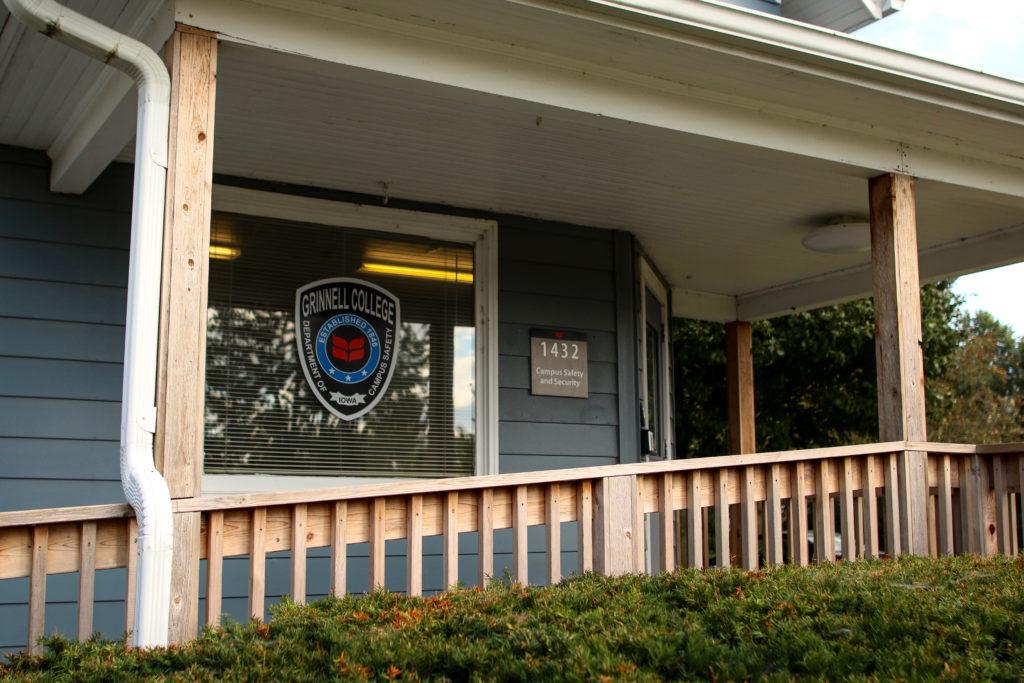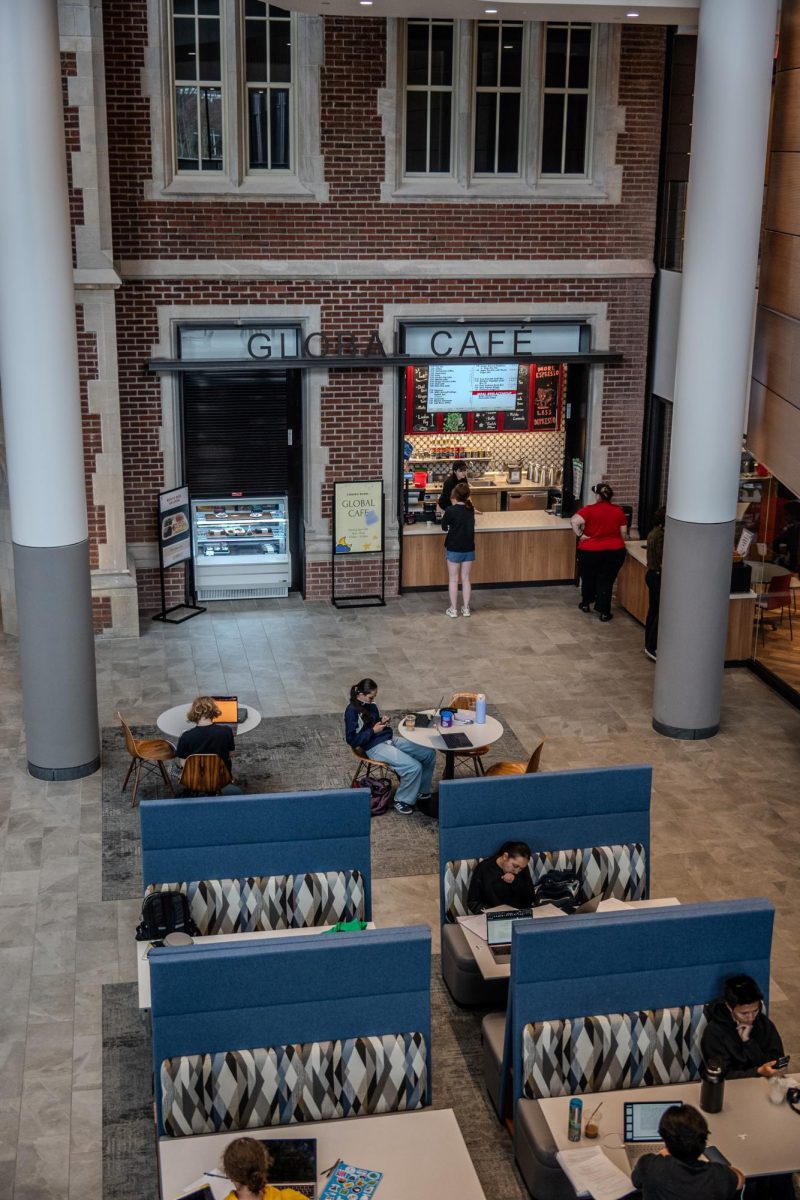
By Candace Mettle
mettleca@grinnell.edu
The arrest of a student on campus two weekends ago startled the College community, leading to dialogues on the presence of police on campus, the role of Campus Safety and Security and the protected rights of College community members.
The arrest, by Sergeant Ben Gray of Grinnell Police Department (GPD), was filmed and appeared on social media platforms until it was taken down out of respect for the privacy of the student. Witnesses of the arrest claim that the student had been holding alcohol off campus, which raised the attention of police officers patrolling the area. The student ran onto campus, where the student was arrested. No one from the College had called for the police. College administrators learned of the arrest from campus safety, who happened to be on the site of the arrest. The campus safety officer in the video demanded that students stay back and stop filming, which alarmed witnesses, as anyone has the right to film the police.
Following the arrest, Andrea Conner, associate vice president of student affairs, and James Shropshire, the new director of campus safety, said they have worked with Grinnell Police Chief Dennis Reilly to review the incident and re-instill trust in the College community. They have reviewed the film from the witness, along with the body camera of Gray and the other arresting officers. Conner and Shropshire have also begun to create workshops for all security officers to remind them of the rights of citizens and how to conduct themselves in tense situations. Some fruits of their labor will appear in October, when the officials, with the assistance of SGA, will host a Community Hour titled “Know Your Rights.”
“I feel that trust is something that the Department of Campus Safety must foster and maintain on a continuous basis,” wrote Shropshire in an email to The S&B. “Trust, or lack thereof, is not something that exists in a vacuum and requires work or restoration when violated. Our goal is to always seek to improve upon the trust we have and will endeavor to establish greater trust with the campus community in the future. I think that the principles of consistency and transparency, coupled with intentional engagement with the campus community and a customer service model of operations will serve this purpose.”
In the meantime, Conner wants to make sure that College community members are aware of the abilities of police and campus safety. As part of the role of associate vice president of student affairs, Conner oversees the department of campus safety and, along with Shropshire, acts as a liaison between the College and GPD.
“Police are absolutely allowed on campus at any point and time their work brings them here,” Conner said. Conner, along with other members of the College community, have noticed that there is a misperception that police need permission from the College to come onto campus. Yet, because the College sits in the jurisdiction of GPD, the police have the right to patrol and enter any open College buildings without notice. Only when the police want to search a student’s dorm room would they need a warrant or subpoena, as the state of Iowa requires. Means of funding forms the primary difference between private and public institutions; private institutions are not treated as private property, which would legally require a court order before entry by the police.
However, because of the close relationship between the College and GPD, Conner said that GPD usually notifies the College before coming on campus. In turn, the College readily assists the police in ways that do not violate FERPA rights of students, faculty and staff. Nonetheless, as Conner stresses, the relationship is not an open one. Information does not flow freely between the two parties and actions do not go unquestioned.
“The Grinnell Police Department provides emergency response to Grinnell College and their assistance and presence on campus is necessary in a variety of ways,” Shropshire said. “The most noticeable interaction between GPD and the campus community is during emergency response. However, there are more passive functions and duties completed by the Grinnell Police Department. Most notably, serving as a presence and a deterrent to criminal activity on our campus, within the neighborhoods that our students, faculty and staff reside in, and the City of Grinnell as a whole.”
When interacting with the police, Conner said, “Compliance in the moment and expressing your concerns later” is the safest option. However, Conner also recognizes that it is much easier said than done and that the sentiment does not help people who feel powerless in front of officers, whether of the law or campus safety.
Resources for students exist on campus if they find themselves a subject of interest for the police. Usually, a Residence Life Coordinator (RLC) will come to the assistance of the student if the dean on-call fails to arrive. A friend or any trusted member of the community can stay nearby as the student interacts with the police, but that right is gone if the police require questioning of the student at the police station. In that situation, the GPD will only allow a lawyer or a crisis advocate to be with the student.
Campus safety employs a model of “community policing,” which Conner describes as an arrangement in which officers engage with College community members in non-emergency settings to build trust and make delivering justice a promise. Campus safety officers have no weapons on the job and have no citation power. If an officer sees a student, faculty or staff member acting in a harmful manner or violating a College policy, their only power is to make a report of the College community member and alert the dean of students. Campus Security functions primarily to provide escorts for students that feel unsafe, make sure buildings remain locked during after hours and patrol campus. Yet all campus security officers are trained to respond to emergencies and frequently do so, from helping a student with a broken arm, to responding to alcohol poisoning, to assisting the police if they arrive on campus.
Conner also hopes that community policing alleviates some fears of officers, especially at a time when police brutality and unfair sentencing are rampant issues that target many marginalized identities that are a part of the College community. However, Conner feels certain that Shropshire will make a lasting difference on campus.
“[The College is] an environment that’s conscious of social justice issues and we’re in an environment that cares a lot about people, but also don’t want to be obtrusive,” Conner said. “I think [Shropshire’s] presence in campus safety will be really stabilizing. There’s been a lot of transition and growth as we’ve tried to increase the number of dispatchers so there wouldn’t be as many student dispatchers. He’s got a lot of work to do but he’s the right person for it.” Conner oversaw and approved the hire of Shropshire, who stood out from the rest of the candidates.
Conner encourages students to reach out to the office of student affairs and/or Campus Security if they have any concerns or suggestions to improve the department. Campus Security works to keep the College safe, so it is paramount that the community has input in their operations.





























































Dan • Sep 17, 2017 at 8:35 pm
I can’t say I’m surprised anymore by the treatment of the student by a GPD officer now knowing that it’s Officer Gray. From my first day on campus first year, I was told that most GPD officers were nice but to always keep an eye out for Gray. Curious to see if the S&B will run a piece specifically on him and his history with college students. Maybe the warnings I was given were folkloric but possibly they could have been condemning a history of this abuse of power.